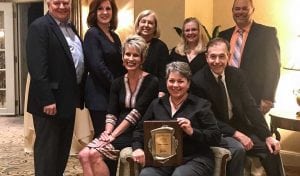Given the incessant news out of Washington highlighting partisan bickering and gridlock in Congress, it can be hard to tell whether our elected leaders are listening and being responsive to the concerns of rural Americans. That’s why America’s electric cooperatives urged members to get out and vote in the last election and are now focused on advancing the interests of rural communities in our nation’s capital. We’ve asked for a seat at the table—a request that’s been met with some success.
Early this year, the National Rural Electric Cooperative Association (NRECA), our national service organization in Washington, led a group of more than 40 organizations in sending a letter to President Trump asking him to make rural issues a top priority of his administration. “As you witnessed first-hand during the campaign, the issues facing rural America are no less significant than those facing urban parts of the country, but can be more easily overlooked because America’s small towns and rural areas make up just 15 percent of the nation’s population,” the groups wrote.
To address this concern, the organizations urged the president to designate a senior member of the White House staff to take point on rural issues or establish an office of rural policy within the Executive Office of the President. In response to this and other electric cooperative outreach efforts, the president in late April signed an executive order establishing an inter-agency Rural America Task Force to examine the issues facing rural America and identify actions needed to address them.
NRECA CEO Jim Matheson called the creation of the task force “a key step as we seek to develop rural communities economically. That includes implementing new energy technologies to meet tomorrow’s energy needs, while also deploying broadband and other services to enhance daily lives throughout rural America.”
Electric cooperatives also have been weighing in on another big topic in Washington: the need to improve the nation’s aging infrastructure. Co-ops have told policymakers that they must look beyond merely repairing roads and bridges if a federal infrastructure initiative is going to meet the needs of rural communities. High on co-ops’ list of priorities is closing the rural-urban digital divide by expanding rural access to high-speed Internet service, which Matheson calls “a key ingredient for a healthy 21st century economy, particularly in rural areas.”
Given this imperative, co-ops were very pleased when the Federal Communications Commission (FCC) appointed Matheson to serve on a newly created Broadband Deployment Advisory Committee. The mission of the panel, which held its inaugural meeting in April, is to advise and make recommendations to the FCC on how to accelerate the deployment of broadband by reducing and removing regulatory barriers to infrastructure investment. Matheson will work to ensure that rural needs are addressed.
This isn’t to say that everything in Washington will go co-ops’ way. The federal government is a massive bureaucracy with many interests vying for attention. But there’s one thing you can count on: Electric cooperatives will fight to make their voices heard on Capitol Hill and within the many federal agencies that impact the quality of life in rural communities. They’ll always strive to get a seat at the table.
Dan Riedinger writes on consumer and cooperative affairs for the National Rural Electric Cooperative Association, the Arlington, Va.-based service arm of the nation’s 900-plus consumer-owned, not-for-profit electric cooperatives.



